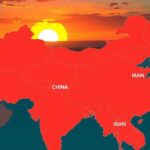Iran’s Trade Relations with Afghanistan: Non-Oil Exports Exceed $2 Billion
Iran exported over $2 billion in non-oil goods to Afghanistan between March 2024 and February 2025, making Afghanistan its fifth largest export market. Recent meetings between officials from both countries signify a deepening trade relationship aimed at enhancing economic cooperation across various sectors.
Iran has successfully exported non-oil goods valued at $2.2 billion to Afghanistan over a period spanning 11 months, from March 20, 2024, to February 18, 2025, as reported by the head of the Iran Customs Administration (IRICA). This trade highlights Afghanistan’s position as Iran’s fifth largest export destination during this timeframe.
In recent months, trade relations between Afghanistan and Iran have strengthened significantly. Notable engagements include a meeting between the governors of both central banks during a banking technology summit in Yekaterinburg, Russia, aimed at enhancing monetary cooperation.
Additionally, Iranian and Afghan maritime officials convened in October to explore investment avenues for Afghan businesses at Iran’s Chabahar Port, attended by several dignitaries from both sides. Meanwhile, Afghanistan’s interim Deputy Prime Minister expressed the nation’s desire to attract Iranian investors for the development of its mining industry, solar energy generation, and railway connectivity expansion.
Afghanistan primarily relies on imports for over 80% of its market needs, with approximately 25% of these imports sourced from Iran. The past two years have seen improvements in trade conditions owing to the establishment of national security and a stable central government in Afghanistan.
In conclusion, the burgeoning trade relationship between Iran and Afghanistan, exemplified by significant non-oil exports and collaborative investment discussions, underscores the importance of mutual economic development. As both countries work to enhance their trade ties, it is vital to address logistical and regulatory challenges to facilitate smoother exchange and growth in the region’s economies.
Original Source: www.ariananews.af








Post Comment